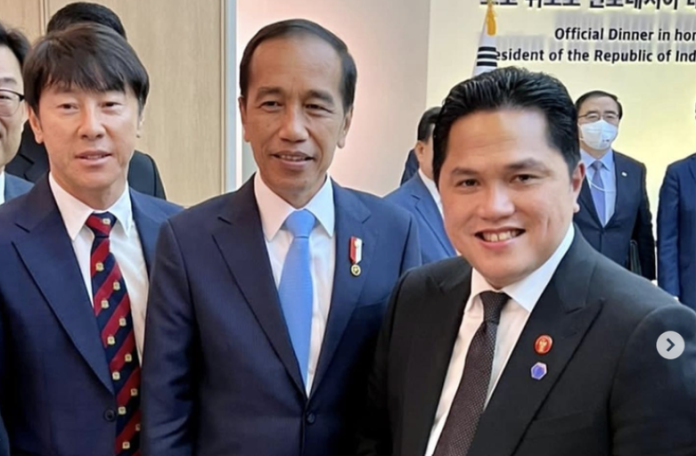Indonesian president Joko Widodo (centre) and PSSI Chairman and Minister for State-Owned Enterprises Erick Thohir (right)
Following weeks of wrangling and uncertainty, the stand-off between FIFA and the Indonesian Football Association (PSSI) appears to have finally been settled. After the impromptu cancelling of the U-20 World Cup set to be hosted in the country – due to internal protests at the participation of the Israeli football team – many anticipated the host nation to be handed a temporary ban from future FIFA events.
However, following a meeting between PSSI Chairman Erick Thohir and FIFA President Gianni Infantino in Paris yesterday, Indonesia appears to have escaped with nothing more than a yellow card, with statements issued by FIFA and Mr. Thohir both confirming that severe sanctions are off the table. Instead, FIFA Administration has provisionally recommended a restriction on the use of FIFA Forward funds until Mr Thohir’s strategic plan for Indonesian football has been reviewed.
Mr. Thohir clearly played a weak hand well, but FIFA’s statement also made clear that football’s governing body has been sufficiently impressed by the country’s preparations and ‘continuing efforts to transform Indonesian football’, leaving the door open for Indonesia to put its world class infrastructure to practice.
This means that the archipelago nation will continue to compete for participation in the FIFA World Cups, Asian Games and the ASEAN Football Federation (AFF) Championship.
Looking forward, Indonesia should consider this an opportunity to find the social and political cohesion required to think towards the future. This is because Indonesia’s sporting ambitions can be seen as a microcosm of its broader economic potential.
Hosting a major sporting event like the FIFA Under-20 World Cup requires significant investment in infrastructure, logistics, and security. The PSSI was emphatic that its preparations had been complete before the debacle unfolded, with stadium readiness, accommodation and transportation all reported to have been expertly executed by Mr. Thohir’s team.
Of course, Indonesia has experience in hosting international sports events, having successfully hosted the 2018 Asian Games in Jakarta and Palembang. The country has also hosted other major sporting events in the past, such as the 2007 Asian Cup and the 2013 Islamic Solidarity Games.
The country’s investment in sports is no coincidence, and closely tied to President Widodo’s broader ‘Vision 2045’ for economic development. There are four obvious parallels between the two, in the form of infrastructure development, job creation, tourism promotion, and national pride.
One of the key components of Vision 2045 involves improving transportation, energy, and telecommunications infrastructure across the country. In recent years the country has allocated tremendous resources towards new stadiums, upgrading existing facilities, improving national transport links and expanding and upskilling the labour force in these vital areas.
This has helped boost job creation – another major pillar of Vision 2045 – across construction, hospitality, security and transportation. Significant momentum will need to be maintained if the country is to live up to its ambitions of reducing unemployment from an already low base over the course of the next two decades.
The plan also aims to boost Indonesia’s tourism industry, which is a major contributor to the country’s economy. The world-class sporting facilities developed by the PSSI can also be used to attract alternative international sporting events and tournaments – such as Rugby, American Football exhibitions or even the Olympic games – as well as domestic competitions, which can generate significant tourism revenue.
Last but not least, sporting prowess helps to foster a sense of national pride and unity, which aligns with Vision 2045’s goal of promoting a strong sense of nationalism among Indonesians. By hosting major sporting events in the future, Indonesia can showcase its capabilities to the world and boost its reputation on the global stage.
Besides his role leading the football association, recent polling seems to suggest that voters have been impressed by Mr. Thohir’s parallel track record as the Minister of State Owned enterprises, in which capacity he is widely credited with fighting corruption for having helped to uncover and investigate the Asabri and Jiwasraya insurance frauds and Garuda Indonesia corruption scandal.
Voters will now want to see him bring the fight against corruption to clean up the PSSI and – by extension – any other place that corruption is found in Indonesia while the country seeks to implement its ambitious economic grandplan.
Disclaimer: This article contains sponsored marketing content. It is intended for promotional purposes and should not be considered as an endorsement or recommendation by our website. Readers are encouraged to conduct their own research and exercise their own judgment before making any decisions based on the information provided in this article.


























![“Does Everyone Hear Me OK?”: How to Lead Virtual Teams Effectively iStock-1438575049 (1) [Converted]](https://www.europeanbusinessreview.com/wp-content/uploads/2024/11/iStock-1438575049-1-Converted-100x70.jpg)




